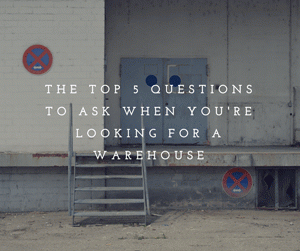The Top 5 Questions To Ask When You’re Looking For A Warehouse
Posted on February 13, 2024 Making the decision to look for a warehouse to grow with your successful business can cause both excitement and wariness. After all, the increasing size of your company means more customers, more profits, and more supplies. Keeping these supplies and products in an office or showroom simply won’t work anymore, leaving you to search for a convenient storage solution.
Making the decision to look for a warehouse to grow with your successful business can cause both excitement and wariness. After all, the increasing size of your company means more customers, more profits, and more supplies. Keeping these supplies and products in an office or showroom simply won’t work anymore, leaving you to search for a convenient storage solution.
Here are a few more reasons you should consider finding a warehouse facility:
- You can give better customer service by answering specific shipping related questions.
- Surplus supplies can be stored and ready to go when demand rises again.
- You probably won’t need to package and process products anymore.
- Warehouses offer better organization when it comes to inventory processes.
Having a warehouse takes care of storage issues while giving you the opportunity to transport products at lower costs. Plus, warehouses are designed to maintain product quality so you can be confident in your deliveries. However, you need to do your research before and during the search to ensure a better experience.
Important Questions To Ask When Warehouse Searching
1. How Big Do You Plan On Growing?
The scalability of a supply chain solution remains an important aspect of the search. If you expect rapid growth, a vendor should offer plenty of options of increasing your square footage while giving you the tools you need to continue quality work. Considering growth at a warehouse facility will save you time and money in the long run.
As we all know, maintaining a building can be very expensive. The rule of thumb is that a 10,000-square-foot steel warehouse will cost between $120,000 and $190,000 depending on its design and construction. There is, however, a wide margin of error—but these estimates are mostly correct.
So, whether or not you decide to spend this much to purchase a large warehouse is up to you. However, depending on the size of your business, you should consider looking for a warehouse that would best suit the size of your company. For example, if you run a large business, it would only make sense that you buy a warehouse that is big enough to accommodate it.
2. Where Should Your Warehouse Be Located?
Whether you are purchasing an existing warehouse or having one built for your business, location should be a key factor in the decision-making process. This is because you would not want to place your warehouse somewhere that would inconvenience you while you want to get work done. Additionally, a good warehouse location can help reduce cost, enable good customer distance, and dictate proper storage requirements. All of these are some benefits of finding a good location for your warehouse.
3. Do These Buildings Have Strong Security?
The last thing that you would want to happen to your business is someone breaking into your warehouse and stealing what belongs to you. Because of this, you should make sure that your warehouse has restricted access so that only you and your trusted employees will be able to enter the warehouse during off-hours. Restricted access will also allow you to be mentally secure knowing that no one will be allowed around your products except authorized staff.
4. What Kind Of Services Do You Require?
You may need special environments to accommodate your products. For example, your supplies might need to be kept in a sterile location or maybe they need to be kept in a more climate controlled place. You should also ask if a warehouse will palletize your shipments, has fullfillment services, and if they can arrange local delivery. These questions will give better insights into what your business needs right now and in the future.
Ideally, you should consider adding a warehouse operations manager if you are looking for a warehouse manager at all. This position would entail tasks such as handling cost, maintenance, and productivity. Though it may seem like a waste of money initially, a position like this would make your life so much easier so you can focus on the more important aspects of your business. So, with that, you might as well just create a “warehouse operations manager job description” and hire the right person. It will be well worth it.
5. Do You Understand Vendor Pricing?
Knowing your budget even before you start looking for a vendor should be a top priority. Then, once you start interviewing possible facilities you can compare costs and services. Make sure you fully understand each warehouse’s pricing structure. Ask about square footage, weight, shipping, and handling charges as these can add up pretty quickly. You might have to adjust your budget to meet the demands of your specific product fulfillment needs.
Finally deciding on a supply chain solution is a rewarding accomplishment. Not only is your business growing, but now you can provide for your customers more efficiently while cutting down on final costs. Plus, you won’t have to sacrifice the quality of your products since they will be properly maintained by trained staff.
Overall, finding the right warehouse will solidify your business’s image to current customers while exposing your brand to new ones.
More Questions To Consider Asking
In the dynamic landscape of supply chain management, selecting the right warehouse for your business is crucial. It’s not just about the location, size, or storage capacity; rather, it delves deeper into the core of warehouse operations. To ensure seamless integration with your business needs, it’s imperative to pose strategic questions about warehouse operations. Here are the top 5 questions that should be on your checklist when you’re on the lookout for a warehouse:
How Efficient is the Order Fulfillment Process?
In the world of e-commerce and rapid order processing, the efficiency of the order fulfillment process can make or break a business. By asking about the warehouse’s order fulfillment strategy, you gain insights into their operational efficiency. Inquire about their order picking methods, technology utilization, and fulfillment timelines. An efficient warehouse should be equipped with the latest technology, such as automated picking systems and inventory management software, to streamline the order fulfillment process and minimize errors.
What Measures are in Place for Inventory Management?
Proper inventory management is the backbone of any warehouse operation. The ability to track, manage, and optimize inventory ensures accurate order fulfillment, prevents stockouts, and minimizes overstock situations. Ask about the warehouse’s inventory control systems, including real-time tracking, cycle counting, and replenishment procedures. A robust inventory management system helps in maintaining optimal stock levels, reducing carrying costs, and ultimately improving overall operational efficiency.
How is Technology Integrated into Warehouse Operations?
With the advent of Industry 4.0, technology plays a pivotal role in modern warehouse operations. Inquire about the warehouse’s technological infrastructure, including warehouse management systems (WMS), RFID tracking, and data analytics tools. A technologically advanced warehouse is better equipped to handle the complexities of modern supply chains, offering real-time visibility, accurate forecasting, and data-driven decision-making. Understanding their technological capabilities ensures that your business can seamlessly integrate with their operations.
What Safety Measures are Implemented in the Warehouse?
Safety is paramount in warehouse operations. Inquire about the warehouse’s safety protocols, training programs, and compliance with industry standards. A warehouse with a strong safety culture not only protects your products but also safeguards the well-being of warehouse staff. Ask about their safety training programs, equipment maintenance practices, and any certifications or accreditations related to safety standards. Prioritizing safety in warehouse operations contributes to a reliable and secure supply chain.
How Flexible is the Warehouse in Adapting to Changing Requirements?
In today’s fast-paced business environment, adaptability is key. Ask about the warehouse’s flexibility in accommodating changing storage needs, seasonal fluctuations, and unexpected surges in demand. A flexible warehouse operation should have scalable solutions, such as adjustable storage configurations, cross-docking capabilities, and a responsive workforce. This adaptability ensures that your business can navigate through uncertainties and scale operations seamlessly.
In conclusion, choosing the right warehouse involves more than just evaluating its physical attributes. By delving into the intricacies of warehouse operations and asking these strategic questions, you can make an informed decision that aligns with your business objectives. Remember, a well-optimized warehouse operation contributes not only to cost savings but also to the overall success and growth of your business in the competitive market.




